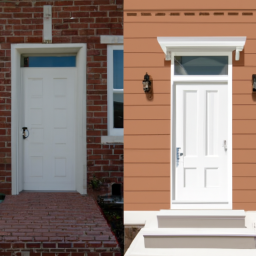Get all the information you need about the "Clear to Close" process in the real estate industry. Understand its importance, the required documentation, common delays, and tips to expedite the process.
Condo Vs House

When deciding between purchasing a condo or a house, it is essential to understand the key differences and considerations associated with each option. This article aims to provide valuable insights and guidance for individuals seeking real estate mortgage education by exploring the nuances of “Condo vs House.” Whether you are a first-time homebuyer or an experienced investor, examining the advantages and disadvantages of both condominiums and houses will enable you to make an informed decision that aligns with your financial goals and lifestyle preferences.
Condo Vs House: A Comprehensive Comparison
When it comes to purchasing a property, one of the main decisions you will face is whether to invest in a condominium or a house. Both options have their own advantages and considerations, and understanding the key differences between them is essential to making an informed decision. This article will explore the various aspects of condos and houses, including cost, ownership, privacy, amenities, size, maintenance, customization, investment potential, location, and resale value.
Cost
Initial cost
The initial cost of purchasing a property is often one of the most significant factors for homebuyers. Condos generally have a lower upfront cost compared to houses, as they involve buying a unit within a larger complex. This can make condos a more affordable option, particularly for first-time homebuyers or those with budget constraints.
Maintenance cost
When it comes to maintenance costs, condos typically have an advantage over houses. In a condominium, the upkeep and maintenance of common areas, such as the building’s exterior, landscaping, and amenities, are shared among the residents through monthly fees. This shared responsibility can help alleviate the financial burden and make condo living more cost-effective in the long run.
Ownership
Individual ownership
When you purchase a house, you become the sole owner of the property and the land it sits on. This provides you with a greater sense of ownership and control over your home, allowing you to make decisions regarding renovations, modifications, and landscaping without seeking approval from others.
Shared ownership
In contrast, when you buy a condominium unit, you own only the individual unit and have shared ownership of common areas with other residents. Shared ownership means that decisions regarding common areas, building policies, and major renovations are made collectively, either through a homeowner’s association or other governing body. This shared ownership structure offers a sense of community and shared responsibility among residents.
Privacy
Private space
Privacy is often a vital consideration for homebuyers. Houses typically offer more privacy as they are standalone structures with their own private yards or gardens. This separation from neighboring properties allows for a greater level of solitude and control over your surroundings.
Shared walls
In a condominium, however, privacy can be compromised due to the presence of shared walls between units. You may be more likely to hear noise from your neighbors and have less control over the level of privacy within your own living space. Privacy concerns can be mitigated by choosing a corner unit or selecting a building with soundproofing measures in place.
Amenities
Building amenities
One of the significant advantages of living in a condominium is the availability of shared amenities. Many condominium complexes offer amenities such as fitness centers, swimming pools, recreational areas, and even concierge services. These amenities can provide added convenience and a luxurious lifestyle for residents, allowing for a more enjoyable living experience.
Limited or no amenities
On the other hand, houses typically do not come with built-in amenities. While you have the freedom to create your own amenities like a private pool or a gym, it will require additional investment and maintenance. Some houses may have access to community amenities such as parks or playgrounds, but they are not as readily available or conveniently located as those in condominium complexes.
Size
Limited space
One of the trade-offs of purchasing a condominium is the limited living space. Condos are generally smaller in size compared to houses, often offering a more compact layout. This limited space can pose challenges, particularly for individuals or families requiring more room for storage, additional bedrooms, or a home office.
More living area
In contrast, houses provide more living area, both indoors and outdoors. Houses often feature multiple levels, extensive yards, and more spacious rooms, allowing for greater flexibility and freedom in terms of layout and functional use. The additional space can be especially advantageous for those with growing families or individuals who require dedicated workspaces.
Maintenance
Responsibility
The responsibility of maintaining a property can vary significantly between condos and houses. With a house, the owner is solely responsible for the upkeep and maintenance of the entire property, including the interior, exterior, and surrounding grounds. This autonomy gives homeowners complete control over the quality and execution of maintenance tasks but also requires more time, effort, and potentially higher costs.
Shared responsibilities
In a condominium, maintenance responsibilities are shared among the residents. Common areas, such as hallways, elevators, and building exteriors, are maintained by the homeowner’s association or management company. This shared responsibility can help distribute the workload and reduce the individual burden of maintenance. However, it also means relinquishing complete control over the timing and quality of maintenance tasks.
Customization
Limited customization
When it comes to customization, condos generally have more limitations compared to houses. Condominium owners may face restrictions imposed by the homeowner’s association on modifications to the exterior appearance, interior layout, or even the type of flooring or window treatments. These restrictions are typically in place to maintain a cohesive look and ensure the well-being of all residents.
Full customization
Houses offer much greater flexibility when it comes to customization. As a homeowner, you have the freedom to personalize every aspect of your property according to your preferences and needs. From renovations to interior design choices, you have complete control over turning the house into your dream home. This level of customization can be particularly appealing for those who value individuality and self-expression.
Investment
Potential for value appreciation
Both condos and houses can be considered as long-term investments, with the potential for value appreciation over time. However, it is crucial to note that the appreciation rate can be influenced by various factors such as location, market trends, and economic conditions. Generally, real estate in desirable areas, whether it be condos or houses, tends to have better prospects for increasing in value.
Potential for value depreciation
While both types of properties can appreciate in value, it is important to consider that condos can be more susceptible to fluctuations in the real estate market. Changes in market conditions or oversupply in the condominium market can potentially impact the value of individual units. Houses, on the other hand, are generally more stable in terms of value and are often less affected by short-term market volatility.
Location
Urban areas
Condominiums are often found in urban areas, offering residents the advantage of living in close proximity to city centers, amenities, and public transportation. The convenience of having restaurants, shops, entertainment venues, and cultural attractions within walking distance can be a significant attraction for those seeking a vibrant urban lifestyle.
Suburban or rural areas
Houses, on the other hand, are more commonly found in suburban or rural areas, providing a quieter and more spacious living environment. Living in a house in these areas offers more privacy, access to larger green spaces, and a sense of community that can be appealing to families or individuals looking for a more serene and family-friendly setting.
Resale Value
Fluctuations in the market
When it comes to resale value, condos can be subject to greater fluctuations in the market. The demand for condominiums can be influenced by factors such as new developments, changes in the job market, or shifts in demographics. This volatility can potentially impact the selling price and time on the market when it comes time to sell your condo.
More stable market
Houses, on the other hand, generally have a more stable market. They tend to be in demand regardless of market conditions, especially in desirable locations. Single-family homes are often seen as a long-term investment and can attract families and individuals looking for stability and a sense of permanence.
In conclusion, the choice between a condo and a house ultimately depends on your individual preferences, lifestyle, and financial circumstances. Consider the factors discussed in this article, such as cost, ownership, privacy, amenities, size, maintenance, customization, investment potential, location, and resale value, to make an informed decision that aligns with your needs and aspirations for the future.


